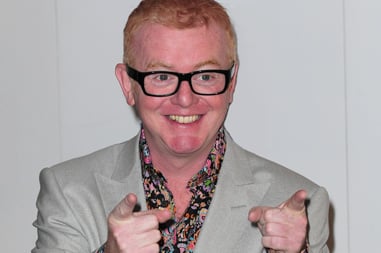TFI Chris Evans: how rebel-turned-mogul shook up the 90s

We look back at how the management style of the UK’s most famous redhead took the media by storm – and contemplate which moguls of today have followed in his footsteps
Jermaine Haughton
Tonight’s revival of legendary Channel 4 chat show TFI Friday ought to provide viewers with a poignant reminder of host Chris Evans’ dominance of UK broadcasting in the 1990s – and his highly individual approach to management and leadership. Rumours suggest that the live, 20th Anniversary special will lay on a feast of celebrity appearances, including ousted BBC personality (and Evans’ personal friend) Jeremy Clarkson, plus surly ex-Oasis singer Liam Gallagher and Britpop survivors Blur for the full injection of 90s minerals and vitamins.
Known for being a workaholic and always working on the edge, the Warrington-born TV producer foged a reputation as a disruptor in his industry, initially anchoring the whacky The Big Breakfast and, by sheer force of adrenalin, driving it to become the nation’s biggest morning show during its heyday. A key element of the programme’s success was its outlandish and colourful tone – certainly by comparison with the BBC’s offering of the same time (and, arguably, even now). It was a model Evans also applied to his tenure as presenter of the BBC Radio 1 breakfast slot, which he was able to put his stamp on by creating the show through his own company, Ginger Productions, rather than in house at the Beeb. However, his stint famously imploded after a string of absences and confrontations with BBC management: on one occasion, Evans was even filmed drinking outside a pub while he should have been on air.
Along with TFI Friday, Evans’ trademark, kinetic style graced Channel 4 game show Don’t Forget Your Toothbrush – the format of which he sold to numerous countries around the world, earning him millions. Evans’ business acumen was one of his biggest assets, with his behind-the-scenes creativity more than a match for his onscreen presence. As part of a consortium, he snapped up his erstwhile employer Virgin Radio in 1997 from Richard Branson for £85m. When the company was later sold to the Scottish Media Group in 2000, Evans reportedly made £35m. As the laddish bravado of TFI Friday waned in popularity, Evans sold Ginger Productions in 1999 for £225m, netting him a personal jackpot of £20m – £800,000 of which he gave to Virgin Radio staff in bonuses.
Crucially, Evans was one of a “gang” of young, thrusting game-changers of the time, with Alan McGee at Creation Records and James Brown at IFG also making significant impacts on their industries. McGee’s independent record firm was the leading indie label in the UK for much of the 90s, largely down to the success of Oasis, whose Definitely Maybe LP became a huge critical and commercial success. The band’s Union Flag-emblazoned guitar went on to become a defining symbol of “Cool Britannia”. Creation’s significance to British culture was further highlighted by Labour’s move to hire McGee to lead a media campaign in the run up to the 1997 General Election to boost the party’s appeal to young people.
Brown, meanwhile, launched the magazine Loaded in 1994, which became a pioneering example of the “lads’ mag” format. Also embracing the indie and Britpop culture that was emblematic of the time, Loaded became the leading publication aimed at men aged 18 to 30, with Brown winning the British Society of Magazine Editors’ Editor of the Year award for his work on the title. However, his management style was divisive, with some of his colleagues going on to criticise a tyrannical approach. A former writer told The Independent: “James's whole style of man management is all about fear, just making everyone feel that they’re totally and utterly dispensable. If he’s in the mood to have a go at you in front of everybody, he will. He could pick on anybody. The mood changes were frighteningly sudden.”
Brown is now best known as a talking head and raconteur on various factual TV outlets.
Evans’ heirs: media disruptors of today
Natalka Znak
The former CEO of Zodiak USA is one of the masterminds behind of the rise in reality TV shows, which have dominated UK screens in the past decade. In the UK, she was controller of factual entertainment for ITV Studios in London, where she was responsible for creating and producing I'm Celebrity Get Me Out of Here!, Hell's Kitchen, and Love Island. Now co-founder of new production company Znak&Jones, the experienced producer has launched projects such as Celebrity Wife Swap and Secret Millionaire for the US ABC network. (Source)
Jamal Edwards
With the majority of young people as likely to consume media online as via the TV, the web has provided a fruitful launchpad for young media moguls. Through his platform SBTV, which films performances by recording artist, Jamal Edwards has developed a £8m empire attracting millions of views to his website and YouTube channel. Still in his 20s, Edwards recently received an MBE for his work, and is often recognised as a major figure in breaking singer-songwriter Ed Sheeran to the mainstream. One of Sheeran’s SBTV clips received 7.7 million hits. (Source)
Holly Willoughby
The former children’s TV presenter has honed shrewd business acumen to become a major figure in British media leadership. Through her production company Peaches Productions Ltd, her role in presenting This Morning with Philip Schofield and Surprise, Surprise, panel stints on Celebrity Juice and lifestyle side projects with BHS and clothing retailer Very, the mother of two has more than tripled her income in recent years. (Source)
Fancy sharpening your entrepreneurial skills to become the next Chris Evans? Then find out about CMI’s forthcoming Growing Your Small Business talks at the Events and Courses page.
Image of Chris Evans courtesy of Featureflash / Shutterstock.

Press & Media Enquiries
For more information or to request interviews, contact CMI's Press Team on 020 7421 2705 or email press.office@managers.org.uk


